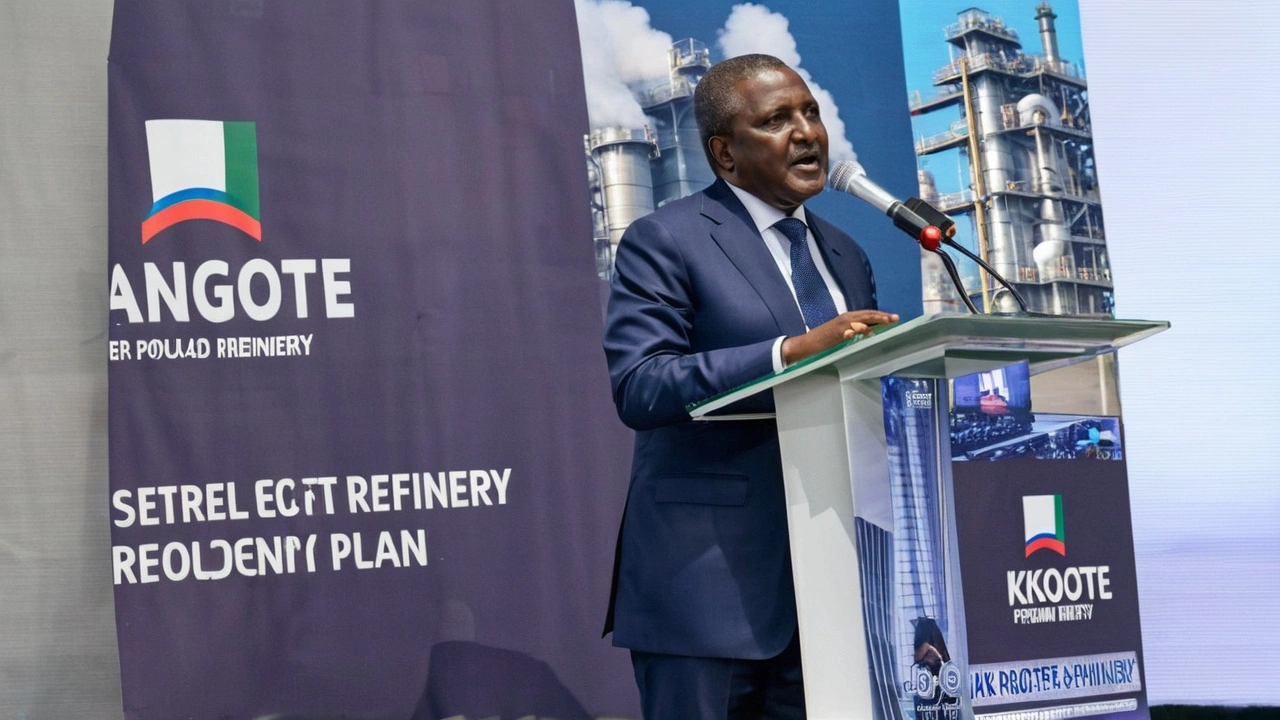Dangote Group Withdraws from Nigerian Steel Investment Amid Monopoly Concerns
Aliko Dangote, Africa's wealthiest individual and influential CEO of the Dangote Group, announced a significant pivot in the company’s strategic direction by stepping back from planned investments in Nigeria's steel industry. This decision is rooted in a proactive effort to preclude any accusations of monopolistic practices that could tarnish the company's reputation and business standing.
Initially, Dangote had voiced a robust ambition for the steel sector, with plans articulated in June to ensure that West Africa's steel requirements were met through Nigerian production. The aim was to invigorate the local industry and curtail the dependence on imported raw materials, which aligns seamlessly with Dangote's broader mission of fostering indigenous industrial growth. However, upon careful consideration, the Dangote Group's board determined that entering the steel market might lead to perceptions of market overreach.
The Dangote Group's decision can also be viewed through the lens of Nigeria's checkered history with steel projects, marked by challenges and irregularities. Notable failures include the Ajaokuta steel plant and Delta Steel Company, alongside other ventures like the Osogbo and Jos rolling mills. These projects have historically faced severe operational bottlenecks, financial mismanagement, and a lack of strategic direction, which together reduced their potential to herald an industrial renaissance.
The backdrop of these failures influenced the Dangote Group's decision, emphasizing a strategic pivot towards avoiding any path that might be perceived as monopolistic, especially in an industry critical to Nigeria's industrialization dreams. In alignment with this approach, Dangote calls upon other Nigerian investors to capitalize on the steel sector's potential and take bold steps in revitalizing the industry. This appeal is strategic; it positions the company as a patriotic entity focused on collective economic uplift rather than individual gain, thus enhancing the Group’s image.
Yet, this is not just a strategic retreat but a calculated move to foster enticement and investment from other quarters within Nigeria. The move underscores a profound understanding of the economic environment and a willingness to allow a broader range of stakeholders to benefit from the steel industry's growth. Given the centrality of steel in infrastructural development, a diversified investment portfolio in this sector can lead to a more competitive market environment.
This announcement and shift in strategy come at a critical time, coinciding with President Bola Tinubu's administration's promises to reignite the embers of the nation's dormant steel sector. During his campaign, Tinubu had emphasized the importance of resurrecting the Ajaokuta steel complex, perceived as a symbol of industrial potential continually shackled by misfortune and mismanagement. By stepping back, the Dangote Group sends a clear signal and sets the stage for a possible coalition of domestic investors to take up the mantle and drive the industry toward sustainable success.
Historical Context: The Ajaokuta Steel Complex and Other Failures
To truly understand the magnitude of this situation, one must appreciate the historical context surrounding Nigeria’s past attempts at steel production. The Ajaokuta Steel Complex, conceived during the 1970s, was envisioned as a cornerstone of Nigeria’s industrial ambition. However, decades of infrastructural decay, policy inconsistencies, and financial mismanagement rendered this giant of a project a near relic. Despite several revitalization efforts, the project's full potential remains unrealized.
Other instances like the Delta Steel Company and regional rolling mills in Osogbo and Jos further exemplify the systemic issues plaguing Nigeria’s steel industry. Each of these projects promised to bolster local industrial capacity but fell short due to similar inefficiencies and operational issues, casting a long shadow over future ventures.
Within this landscape of industrial hope and historical setbacks, Aliko Dangote's pivot away from steel signifies a nuanced understanding of both market dynamics and public perception. His decision underscores the importance of fostering a balanced economic environment where monopolistic accusations do not stymie broader industrial progress. Therefore, encouraging investment from other Nigerians is strategic to create a more competitive and resilient steel industry.
The Strategic Implications for Dangote Group
For the Dangote Group, this retraction from the steel industry does not equate to retreat but a redirection towards leveraging their substantial resources in other impactful areas. Given Dangote's footprint in sectors like cement, sugar, and most recently, refining, the Group continues to underscore its commitment to Nigeria's broader economic development. Diversification remains key to the Group’s expansive strategy, aligning their operations with national and regional developmental goals without drawing discontent.
In navigating the complexities of Nigeria's industrial landscape, Dangote's decision to step back from steel investments highlights a focus on corporate responsibility and ethical considerations in business operations. By addressing potential competition concerns preemptively, the Dangote Group is strategically safeguarding its long-term interests and corporate image. This move resonates particularly well in an economic environment where public perception and regulatory scrutiny play critical roles in determining business success.
Conclusion: A Call to Action for Nigerian Investors
Ultimately, Aliko Dangote’s strategic shift away from steel invites a broader discourse on the future of Nigeria’s industrial endeavors. It underscores an opportunity for other stakeholders to step forward and fill the void, leveraging the lessons of the past to forge a more robust and sustainable steel industry. This collaborative approach between private investors and government initiatives could chart a path towards industrial rejuvenation, fostering sustainable economic growth.
The Dangote Group's decision reverberates as a multifaceted strategy that balances ethical business practices with long-term industrial goals. It is a testament to the company's adaptive strategies and commitment to stakeholder interests, setting a precedent for responsible business conduct and supporting Nigeria's developmental ethos. As other investors heed this call, it potentially marks the dawn of a new chapter in Nigeria’s industrial narrative.




Alright, let’s break this down. Dangote’s retreat from steel is not just a clever PR move; it’s a textbook case of market foresight. By pulling out before monopolistic accusations surface, they sidestep a potential regulatory crackdown that could cost billions. The Nigerian steel sector has a legacy of underperforming megaprojects – Ajaokuta, Delta, you name it – and any big player stepping in would be under a microscope. It’s also a signal to other local investors: the space is wide open for diversification without a single titan hogging the market share. Economists have long warned that concentration can stifle competition and innovation, and Dangote seems to have internalized that. Moreover, this decision aligns with President Tinubu’s promises, positioning Dangote as a collaborative partner rather than a rival. In short, this isn’t a retreat; it’s a strategic repositioning that safeguards both brand and bottom line. It will be interesting to see who steps up to fill the vacuum and whether they can avoid the pitfalls of past attempts.
Thanks for the deep dive, man. i totally get why Dangote would wanna avoid lookin like a monopoly cuzz they got a rep to mantain and all that.
It’s great to see a big company thinking about the bigger picture and making space for others. This could really boost local businesses and give more jobs.
Whilst the strategic withdrawal may appear prudent, one must consider the ramifications of perceived market hegemony – an outcome that could enfeeble the equilibrium of the sector.
Dangote knows the game – better to bow out gracefully than get tangled in antitrust drama. 👍🏽💼
Exactly! This move shows real leadership and opens doors for fresh players to step in and innovate 🙌
The historical failures you mentioned underline the need for careful planning and transparent governance. New investors should learn from those past mistakes to build sustainable operations.
Indeed, it is paramount that any forthcoming venture upholds national interests and does not succumb to foreign exploitation, thereby preserving the sovereignty of our industrial assets.
Wow another corporate drama – Dangote plays the victim and everyone’s supposed to cheer. Typical power play.
It’s understandable to feel a bit frustrated when a heavyweight like Dangote makes a sudden shift, but let’s look at the silver lining. Their decision opens a real opportunity for homegrown entrepreneurs who have been waiting for a chance to enter the steel market. By stepping aside, they are essentially handing over the baton, which could lead to a diversification of expertise and innovation across the sector. Moreover, the government’s push to revitalize steel aligns perfectly with this new opening, creating a supportive environment for fresh investments. For the local workforce, this could translate into more jobs and skill development programs tailored to modern steel production techniques. It also sets a precedent that even the biggest players are willing to prioritize national interest over personal gain. In the long run, such collaborative dynamics could strengthen Nigeria’s industrial base, making it more resilient against global market fluctuations. So while it may seem like a setback for Dangote, it could actually be a catalyst for broader economic growth and empowerment for many Nigerians.
Sure, everyone’s singing praises about the ‘opportunity’ but let’s not forget that the steel sector has been a nightmare for decades. If new investors don’t bring serious expertise, we’ll just be watching another ghost project rise and fall.
Ah, I see you’re skeptical, but think about the untapped potential – there’s a huge market waiting 🙌. Even with past fails, many of those were due to poor management not lack of demand. If we can combine local know‑how with some fresh tech, we could finally get the steel rolling! 😃 Just imagine the jobs and the boost to other industries 🚀. Let’s hope the new players learn from the past, fix the shortcomings and make this work.